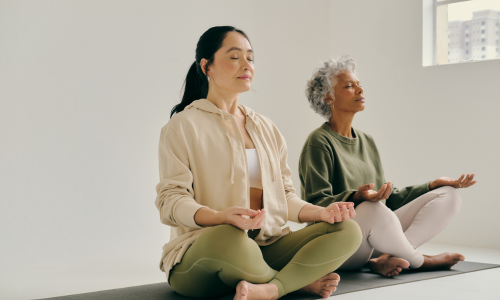Well-being
Breathing techniques for body and mind
Breathing is automatic, but breathing consciously is transformative. Learn easy techniques to calm your body and mind with your own breathing.
Advertisement

Have you ever stopped to pay attention to how you breathe? Do you know breathing techniques to increase your well-being in a simple way?
Breathing is automatic, but the rhythm at which we do it says a lot about what we are feeling — even if we don't realize it.
Thus, in moments of stress, breathing tends to become short and rapid — a direct reflection of the tension we carry.
But there is a way to break this cycle: learn to breathe consciously.
So, in this article, you will learn easy practices that help calm your body and mind — and it all starts with your next breath.
Why does conscious breathing make such a difference?
Breathing is an involuntary act, but when done mindfully, it can completely transform the way you live in the present.
Breathing is like the body's natural switch: it connects directly to the nervous system and can calm the mind with just a breath.
So, by breathing consciously, we activate the parasympathetic system — the one that helps us relax and regain balance.
Several studies have already proven that deep breathing techniques reduce cortisol (stress hormone) and help lower blood pressure.
Furthermore, breathing with presence improves mental clarity and strengthens the connection between body and mind, bringing more focus and serenity to everyday life.
Simple breathing techniques to start right now
Breathing consciously is an invitation to self-care — and you can start now, even if you’ve never done anything like it before.
Below, we’ve put together accessible techniques that fit into any routine, even on those busiest days.
Each of them has a specific objective, such as reducing anxiety, improving concentration or bringing more tranquility before sleeping.
The most important thing is to find a calm moment, sit comfortably and let your breathing guide you.
1. Diaphragmatic (abdominal) breathing
This technique is ideal for those seeking immediate relief from stress.
Instead of expanding your chest, you focus on expanding your abdomen as you inhale — which activates your body's relaxation system.
How to do it:
Place one hand on your chest and the other on your belly. Inhale slowly through your nose, feeling your belly expand.
Then, exhale through your mouth, emptying your abdomen. Repeat for 5 minutes. This is a great practice to do before going to sleep or after a stressful moment.
Benefits:
It helps reduce anxiety, improves the body's oxygenation and contributes to a more peaceful night's sleep.
2. 4-7-8 Breathing
Widely used in meditation and relaxation practices, this technique is perfect for those who suffer from insomnia or need to slow down their mind quickly.
How to do it:
Inhale through your nose for a count of 4, hold it for 7 seconds, and then exhale slowly through your mouth for 8 seconds. Repeat the cycle four times.
Benefits:
It calms the nervous system, helps control anxiety and promotes a smooth transition to deep sleep.
3. Square breathing (box breathing)
This technique is even used by athletes and high-performance professionals to maintain focus and reduce stress in times of pressure.
How to do it:
Inhale for 4 seconds, hold for 4 seconds, exhale for 4 seconds, and hold again for 4 seconds. Visualize an imaginary square as you perform each step.
Benefits:
Improves concentration, reduces mental agitation and brings more clarity to important decisions.
4. Alternate Breathing (Nadi Shodhana)
Widely used in yoga practices, this technique is excellent for balancing emotions and promoting well-being in an integral way.
How to do it:
With your right thumb, close your right nostril and inhale through your left.
Then, close your left nostril with your ring finger and exhale through your right nostril. Continue alternating for 2 to 3 minutes.
Benefits:
Reduces tension, balances the cerebral hemispheres and promotes emotional stability — ideal for starting or ending the day on a light note.
How to include these simple breathing techniques in your routine
Now that you know simple breathing techniques, you may be wondering: how do you make this a habit?
The answer lies in consistency and ease. Just like brushing your teeth or drinking coffee in the morning, conscious breathing can become part of your routine.
So, to start, choose a time of day that is already naturally calm: right after waking up, before going to bed or during a break at work.
Additionally, you can combine these techniques with other positive habits, such as stretching, meditation, prayer, or simply a moment of silence.
Therefore, creating small well-being rituals strengthens the bond with yourself and contributes to a healthy, more balanced and conscious routine.
Common questions about conscious breathing
Many people are interested in practicing conscious breathing, but still have doubts about how, when and why to apply it.
Below, we answer the most common questions to help you take your first steps with more confidence and peace of mind.
- Do I need a lot of time to practice conscious breathing?
- No! The beauty of this practice is its simplicity. In just 3 to 5 minutes a day, you can already feel the positive effects. You can start with just a few minutes and gradually increase the time as you feel comfortable. The important thing is regularity, not duration.
- Does conscious breathing really help with anxiety?
- Yes, and that’s one of the greatest strengths of the practice. By breathing with intention, you activate your body’s natural “relaxation mode” — an internal system that invites calm and balance. In times of crisis, deep breathing helps reduce the physical symptoms of anxiety and calms the mind naturally.
- Can breathing better improve my sleep?
- Yes! Techniques such as 4-7-8 breathing are highly recommended for those who have difficulty sleeping. They slow down the body's rhythm, reduce muscle tension and help prepare the mind for rest, contributing to a deeper, more restorative night's sleep.
Take your well-being to the next level with the best meditation apps
Breathing consciously can be very transformative. But with guided meditation, you can deepen this care and find even more emotional balance in your daily life.
Therefore, if you feel that your mind is racing, meditation can be a powerful ally in cultivating presence, focus and inner peace.
And the best part: you can start now, right from your cell phone, with the help of simple, free apps full of features to calm your mind.
So, do you want to find out which are the best meditation apps to transform your routine in a light way? In the next article, we’ll show you.

Meditation Apps: Relax Anywhere
Discover the best meditation apps to relax, reduce stress and improve your quality of life.
Trending Topics

Study Organization Apps: Best Options
Learn how to use study organization apps to optimize everything from planning to executing and reviewing your tasks.
Keep Reading
App to decorate spaces: Visualize your dream home!
Transform your home with an app to decorate spaces! Discover the best options to plan, simulate and renovate your space.
Keep Reading
Apps to edit videos on your cell phone
Discover the best video editing apps and create incredible, professional content with ease and creativity.
Keep ReadingYou may also like

Recover blurred photos: when your heart searches for what you lost
Learn how to recover your memories, even if you deleted them from your phone. Click and discover how: it's free!
Keep Reading
Does Bumble BFF Work? Real Experience Making New Friends
Bumble BFF can help you make new friends, create real connections and overcome loneliness in a fun, safe and easy way!
Keep Reading
Secrets to True Connections: Find Love at Any Age
Learn essential tips for building healthy, lasting relationships, because love at any age is possible and valuable.
Keep Reading